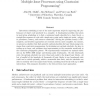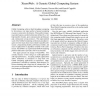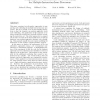59 search results - page 3 / 12 » Evolution-Based Scheduling of Fault-Tolerant Programs on Mul... |
IJAIT
2008
13 years 7 months ago
2008
Instruction scheduling is one of the most important steps for improving the performance of object code produced by a compiler. A fundamental problem that arises in instruction sch...
EURONGI
2006
Springer
13 years 11 months ago
2006
Springer
Wireless sensor networks (WSNs) pose challenges not present in classical distributed systems: resource limitations, high failure rates, and ad hoc deployment. The lossy nature of w...
HPCA
2007
IEEE
14 years 7 months ago
2007
IEEE
This paper evaluates the suitability of the MapReduce model for multi-core and multi-processor systems. MapReduce was created by Google for application development on data-centers...
CCGRID
2001
IEEE
13 years 11 months ago
2001
IEEE
Global Computing achieves high throughput computing by harvesting a very large number of unused computing resources connected to the Internet. This parallel computing model target...
MICRO
1991
IEEE
13 years 11 months ago
1991
IEEE
This paper examines two alternative approaches to supporting code scheduling for multiple-instruction-issue processors. One is to provide a set of non-trapping instructions so tha...



